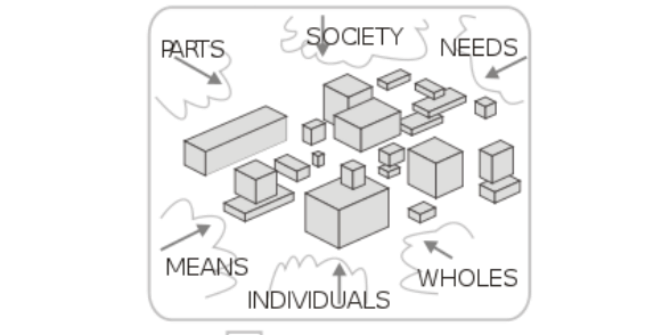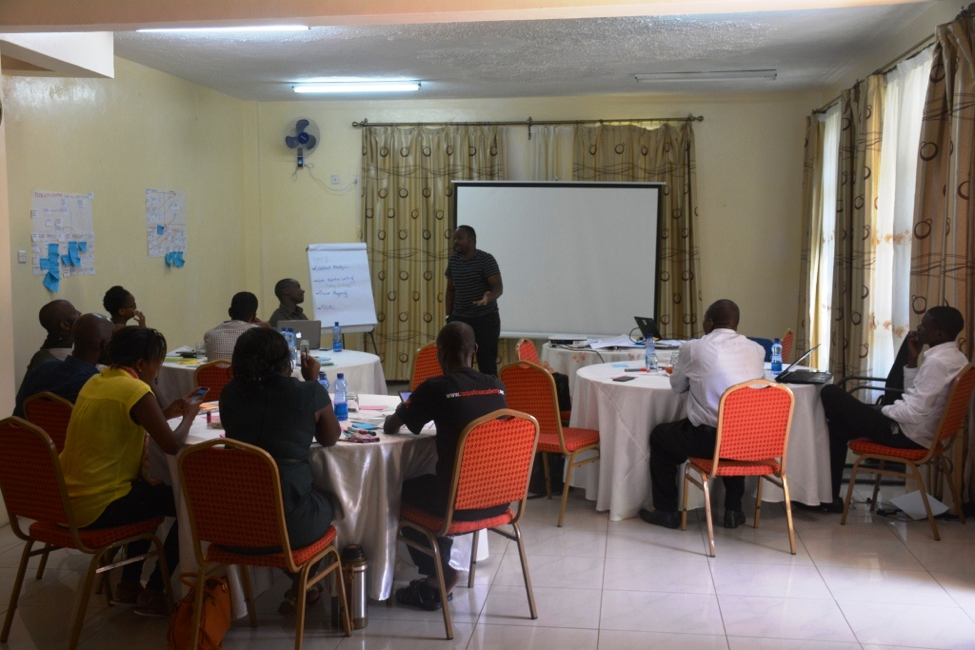Open Knowledge International is a member of OD4D, a global network of leaders in the open data community, working together to develop open data solutions around the world. Here, Simeon Oriko talks about his work carrying out an embedded data fellowship with Oxfam in Kenya as part of the Open Data for Development (OD4D) programme.
For years, traditional non-governmental organisations (NGOs) in Kenya have focused on health, humanitarian and aid initiatives. Most still engage in this type of work but with an increasing shift toward adopting modern approaches that respect historical experience and consider future emerging constraints. Modern approaches such as social innovation models and using solution-based processes such as design thinking are increasingly commonplace in NGOs. Open data practices are also being adopted by some NGOs with the aim of mobilizing all their resources for transformative change.
 Image credit: Systems thinking about the society by Marcel Douwe Dekker CC BY 3.0
Image credit: Systems thinking about the society by Marcel Douwe Dekker CC BY 3.0
As part of an ongoing embedded data fellowship programme with Open Knowledge International, I had the opportunity late last year to meet with some Oxfam in Kenya staff and talk to them about their priorities and their organizational shift towards ‘influencing’ and ‘advocacy’. We spoke about the strategies they would like to adopt to make this shift happen. These meetings helped identify key areas of need and opportunities for the organization to adopt open data practices.
I learned from my conversations that the organization collects and uses data but most of it is not open. It was also made plain that staff faced significant challenges in their data workflow; most lack the skills or technical know-how to work with data and often heavily rely on the Monitoring and Evaluation team to handle data analysis and other key processes.
Oxfam in Kenya expressed interest in building their knowledge and capacity to work with data. One tangible outcome from my conversations was to hold workshops to sensitize them on the value of open data. We held two workshops as a result: one with Oxfam in Kenya staff and the other with some of their partner organizations.
 Open Data Workshop with Oxfam in Kenya Partners – January 26th, 2017
Open Data Workshop with Oxfam in Kenya Partners – January 26th, 2017
On January 13th 2017, Oxfam in Kenya hosted me for a 3-hour workshop on open data. The training focused on 2 things:
- a basic understanding of what open data is and what it does, and,
- helping them understand and map out its potential strategic value in their organization.
The training emphasized 3 key characteristics of open data:
- Availability and Access: We spoke on the need for data to be available as a whole and at no more than a reasonable reproduction cost. We emphasized the need for data to be available in a convenient and modifiable form. It became clear that providing an easy way to download data over the internet was the preferred way of making data easily available and accessible.
- Reuse and Redistribution: The training emphasized the use of licenses or terms under which the data must be provided. Licenses and terms that permit reuse and redistribution including the intermixing with other datasets were recommended. We briefly explored using Creative Commons Licenses to license the data openly.
- Universal Participation: The idea that anyone must be able to use, re-use and redistribute the data, was emphasized as important practice in both principle and practice.
Part of the training showcased tools and visualizations to show the strategic value of open data. This was helpful in making concrete the concept of open data to the majority in the room who either had a vague idea of open data, or were learning about it for the very first time.
In follow-up meetings, there was an express interest in sharing this knowledge with some of Oxfam in Kenya’s partner organizations. This conversation led to the second workshop hosted by the Oxfam’s tax justice team for some of their partner organization: Inuka ni Sisi, Caritas Lodwar, National Taxpayers Association (NTA) and ALDEF. This training took place in Nairobi on January 26th 2017. The majority of participants for this workshop were people who ran and worked in grassroots organizations in various parts of Kenya including Wajir and Turkana.
The training followed the same format and highlighted the same themes as the one carried out for staff. We also took time during this training to help participants identify data sources and data sets that were relevant to their programs. Some participants were keen to find revenue and expenditure data from their local County Governments. A few more were interested in comparing this data with population distribution data in their regions. Most of this updated data is available on Kenya’s national Open Data portal. This granted us the opportunity to explore data publishing tools.
From conducting these trainings, I learned of a clear need to offer very simple, entry-level workshops to expose traditional NGOs and their local partner organizations to open data and its value. Many of these organizations are already working with data in one way or another but few understand and reap the benefits that data can accord them due to a lack of knowledge and capacity.
In the interest of helping these organizations mobilize their resources for transformative change, I believe actors in the global open data community should seek out local development actors and create programs and tools that easily onboard them into the open data ecosystem with a focus on building their capacity to work with data and collaborating with them to drive increase adoption of open data practices at the grassroots and community level.
In collaboration with the OD4D program, Open Knowledge International coordinates the embedded fellowship programme which places an open data expert in a CSO over 3 months to provide support in thinking through and working with open data.
Simeon Oriko is carrying out an embedded data fellowship with Oxfam in Kenya as part of Open Knowledge International’s work on the Open Data for Development (OD4D) programme.








